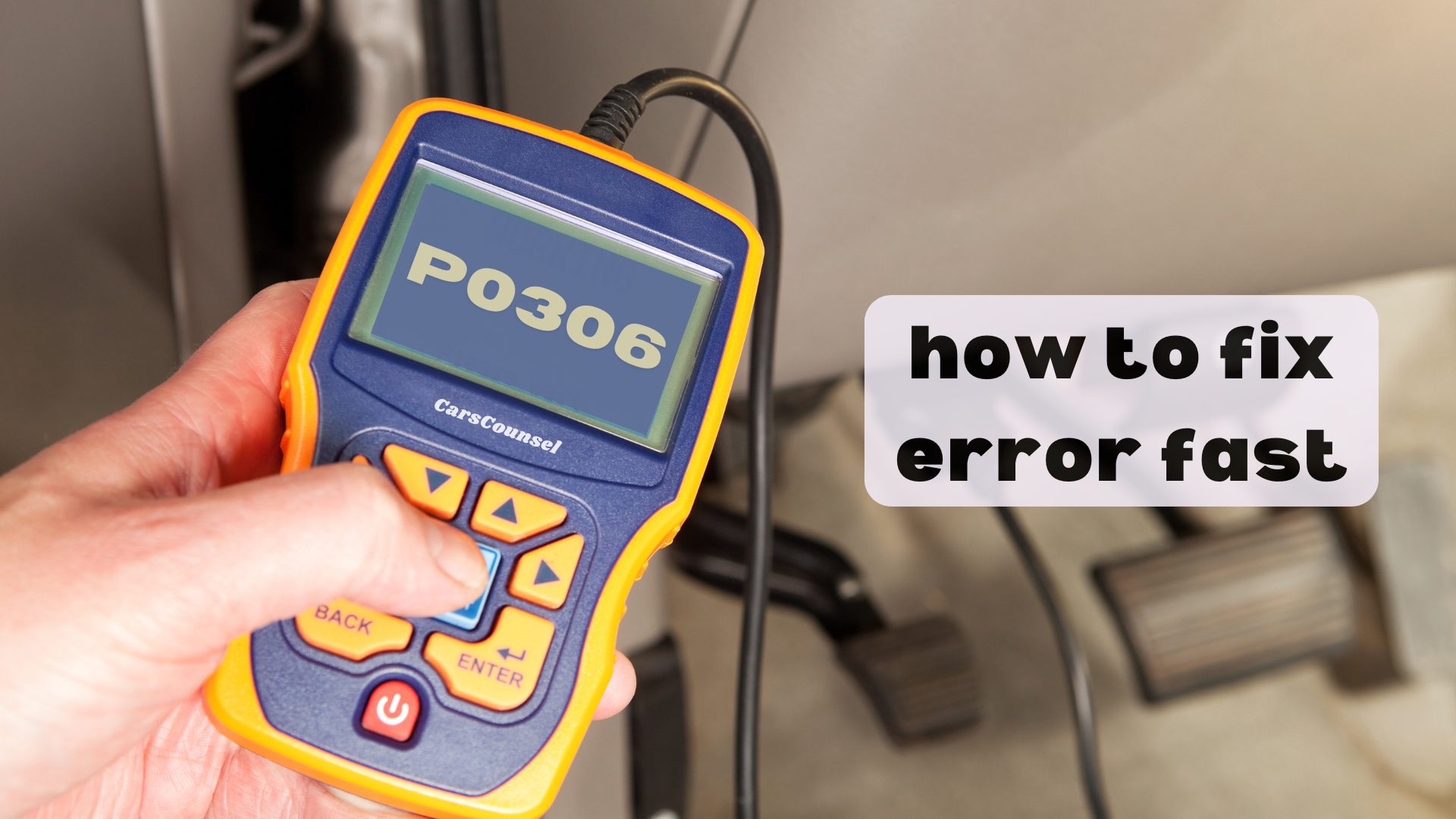Think of your car’s engine as a well-tuned band, and a P0306 code is like a musician playing out of sync. This code means there’s a misfire in cylinder 6, which could make your car run rough or trigger the check engine light.
To fix this quickly, start by checking the spark plug and ignition coil, as they’re often the culprits. Also, don’t forget to look at the fuel injector and check for any vacuum leaks.
Following these steps can help you save time and money, getting your engine back to running smoothly. Want to know more? Here’s the lowdown.

Quick Navigation
Key Takeaways
- Check the spark plug in cylinder 6 and replace it if it looks worn out or damaged.
- Test the ignition coil for cylinder 6 and replace it if the spark is weak or inconsistent.
- Inspect the fuel injector for cylinder 6 and clean or replace it if it’s clogged or not working right.
- Look for any air leaks in the intake system and fix them to make sure the air-fuel mix is correct.
Understanding P0306 Code
The P0306 code, which is a part of a larger set of OBD2 Codes, means there’s a misfire in cylinder 6, which messes up the engine’s ability to burn fuel and air properly. This can cause the engine to run rough and lose power.
When cylinder 6 misfires, it throws off the balance of the air-fuel mix, making the whole engine run poorly. If you don’t fix it, the problem can get worse and cause more damage.
To figure out what’s wrong, you should check for bad spark plugs, ignition coils, or blocked fuel injectors. Also, look for any vacuum leaks, as they can mess up the air-fuel mix too.
Using diagnostic tools can help you find the problem and fix it right.
Symptoms of P0306 Code
If you get a P0306 code, it usually means your car will have a rough idle, lose power, and use more fuel. This happens because there’s a misfire in cylinder 6.
You might feel the engine running unevenly, especially at low speeds, and it won’t accelerate as well. Plus, your car’s fuel efficiency will drop since the fuel mixture isn’t right.
It’s important to spot these issues early to avoid bigger engine problems. Fixing the P0306 code quickly helps keep your engine in good shape and running smoothly.
Diagnosing P0306 Code
To diagnose the P0306 code, start by checking the spark plug in cylinder 6 for any signs of wear or damage.
Use an OBD-II scanner to confirm the code and see the effects of the misfire.
Test the ignition coil with an ignition tester, since a bad coil can cause misfires.
Look at the fuel injector to make sure it’s not clogged and is delivering the right amount of fuel.
Also, check for any vacuum leaks around the engine, as these can mess up the air/fuel mixture and cause a misfire.
By looking at these areas step by step, you can find the real problem quickly.
This approach helps avoid unnecessary repairs and gets your car running smoothly again.
Checking Spark Plugs
Checking the spark plugs is an important first step when dealing with a P0306 code because they can show signs of wear or damage that cause misfires.
Start by taking out the spark plug from cylinder 6. Look for any dirt, carbon buildup, or wear on the electrode. It’s essential to keep your spark plugs in good shape, so replace any that are damaged.
Different types of spark plugs, like iridium, platinum, or copper, last for different amounts of time and perform differently. Make sure to use the right type for your engine to keep it running well.
Regularly checking and replacing your spark plugs can help prevent misfires and improve your engine’s efficiency, tackling a main cause of the P0306 code.
Testing Ignition Coils
To test the ignition coils, start by using an ignition coil tester to check the coil in cylinder 6.
First, find out what type of ignition coils your vehicle has – they could be coil-on-plug, coil pack, or distributor-based.
Then, disconnect the ignition coil from the spark plug and connect the tester.
Turn the engine over and watch the tester’s readings.
If the coil is in good shape, it will produce a strong, steady spark.
If the spark is weak or inconsistent, the coil might be bad and need to be replaced.
Proper testing ensures you diagnose the P0306 code correctly and avoid more engine problems.
Always check your vehicle’s manual for specific testing steps and safety tips.
Inspecting Fuel Injectors
After making sure the ignition coils are working properly, the next step is to check the fuel injectors for any clogs or issues that might be causing the P0306 code.
Keeping your fuel injectors clean is crucial to avoid misfires and ensure your engine runs smoothly.
Here’s how to check and clean your fuel injectors:
- Look for Problems: Check for any leaks or visible damage.
- Test the Electrical Resistance: Use a multimeter to make sure the electrical resistance is within the right range.
- Check the Flow Rate: Make sure the injector’s flow rate is correct to spot any clogs.
- Clean with Ultrasonic: Use an ultrasonic cleaner to get rid of any deposits.
Detecting Vacuum Leaks
Finding vacuum leaks means checking hoses, intake manifolds, and connections for any signs of wear, cracks, or disconnections that might mess up the air/fuel mix.
Start by looking at the vacuum lines for obvious damage.
Use methods like smoke testing, where smoke is put into the intake system to show leaks.
Another good way to find leaks is using an unlit propane torch; if the engine RPM goes up, there’s a leak.
Listening for hissing sounds can also help find smaller leaks.
Fixing vacuum leaks quickly ensures the right air/fuel mix, stops misfires, and improves engine performance.
If needed, get professional help for tough inspections and repairs.
Common Causes of P0306
When checking for vacuum leaks, it helps to know the common causes of a P0306 code to find the problem and fix it effectively. A misfire in cylinder 6 can really hurt your gas mileage and how well your engine runs.
Here are some common reasons why this might happen:
- Faulty Spark Plug: This can cause the engine to misfire and lower your fuel efficiency.
- Bad Ignition Coil: This can also make the engine misfire and reduce how well it runs.
- Clogged Fuel Injector: This can lead to rough idling and a loss of power.
- Vacuum Leak: This messes up the air/fuel mix, hurting your fuel efficiency and engine performance.
Fixing these problems quickly can help your engine run smoothly and save on gas.
Use diagnostic tools to confirm the P0306 code and find out what’s causing it.
Affected Car Models
Certain cars are more likely to have issues with the P0306 code because of how their engines are made and the parts they use.
For example, the Audi A4 3.2 FSI often has misfires due to problems with the camshaft sensor and spark plugs.
The BMW 325i commonly needs new ignition coils because of electrical issues.
The Dodge Ram V8 tends to have problems with the fuel injector in cylinder 6.
Ford Mustang GT models can have faulty spark plugs, and the Honda Accord Coupe V6 with a 3.5-liter engine often has trouble with bad fuel injectors.
Fixing these problems quickly can make your engine run better and avoid more damage.
Always check for other related error codes to make sure you fix everything that needs attention.
Repair Costs and Prevention
Understanding the costs to fix and ways to prevent the P0306 code can save you a lot of trouble and money. Repairs can range from simple to expensive. For example, replacing a spark plug might cost about $100, but major engine repairs can cost thousands.
To keep these costs down, follow these maintenance tips:
- Replace Spark Plugs/Ignition Coils: Regularly check and replace worn-out parts.
- Clean/Replace Fuel Injectors: Keep injectors clean to avoid misfires.
- Fix Vacuum Leaks: Repair any damaged hoses or intake manifolds.
- Follow Maintenance Schedules: Stick to regular oil changes and tune-ups.
More OBD-II Codes
Frequently Asked Questions
What Should You Avoid Doing When a P0306 Code Appears?
When a P0306 code shows up, don’t ignore it or assume it’s just a small issue. Many people wrongly think it’s only a spark plug problem. Use diagnostic tools to find the real issue and stop more damage to your engine.
Can Driving With a P0306 Code Affect Fuel Economy?
Yes, driving with a P0306 code can hurt your fuel economy and engine performance. The misfire messes up the air/fuel mix, leading to poor combustion, which means you use more fuel and your engine runs less efficiently.
Are There Any DIY Methods to Temporarily Fix a P0306 Issue?
Imagine your engine coughing like an old smoker. To temporarily fix ignition issues, you can replace the spark plug, swap the ignition coil with one from another cylinder, and use a fuel injector cleaner. These steps can help you get by for a while.
How Does a P0306 Code Impact Vehicle Emissions?
A P0306 code means your car’s engine has a misfire in cylinder 6. This can lead to more pollution because the misfire sends unburned fuel into the exhaust. This unburned fuel is something your car’s catalytic converter can’t handle completely, which can cause your car to fail emissions tests.
Can Weather Conditions Influence the Occurrence of a P0306 Code?
Did you know that cold weather can reduce your engine’s efficiency by up to 12%? Extreme cold or heat can affect how well your engine runs and might cause a P0306 code because it puts extra stress on the ignition parts.
Conclusion
In short, to fix the P0306 code quickly, you need to check the spark plugs, ignition coils, fuel injectors, and look for any vacuum leaks.
Make sure each part is working right to get your engine running smoothly again and avoid bigger problems later.
Don’t ignore this issue; fixing it now can save you a lot of money in the future.
By tackling these common issues, you’re keeping your car in good shape and running well.

